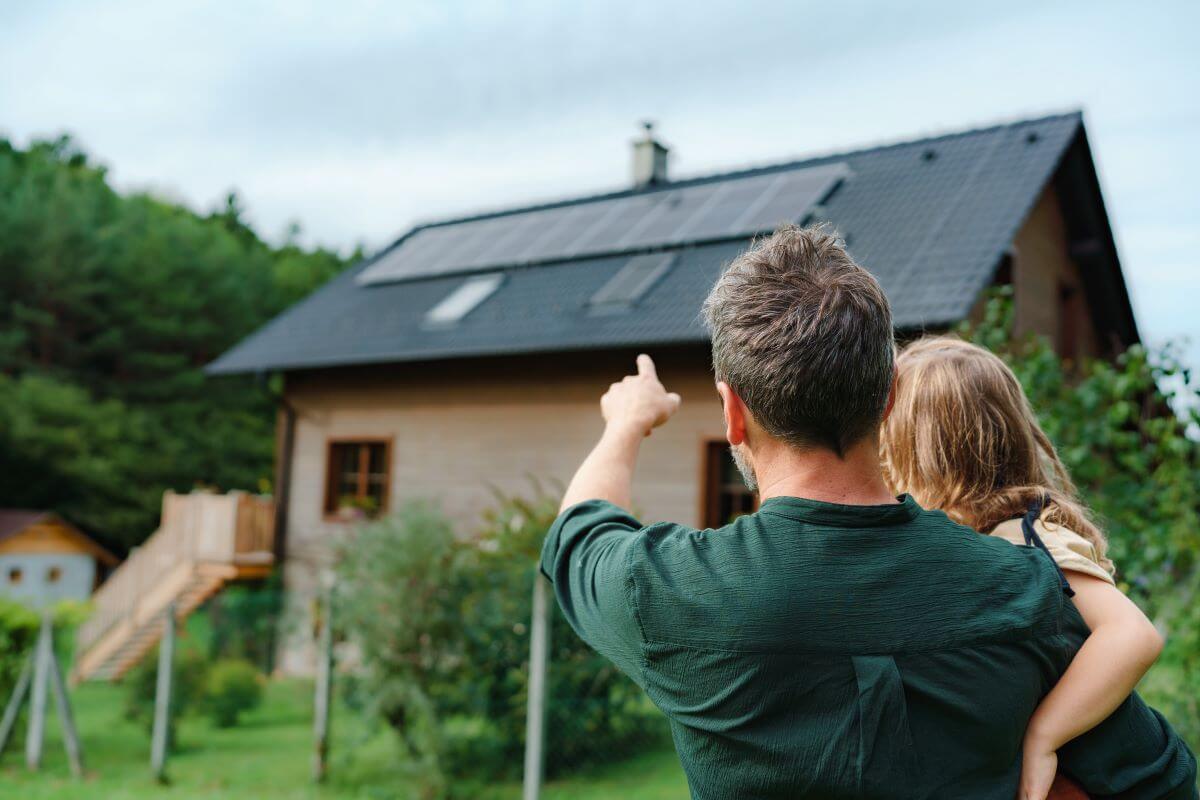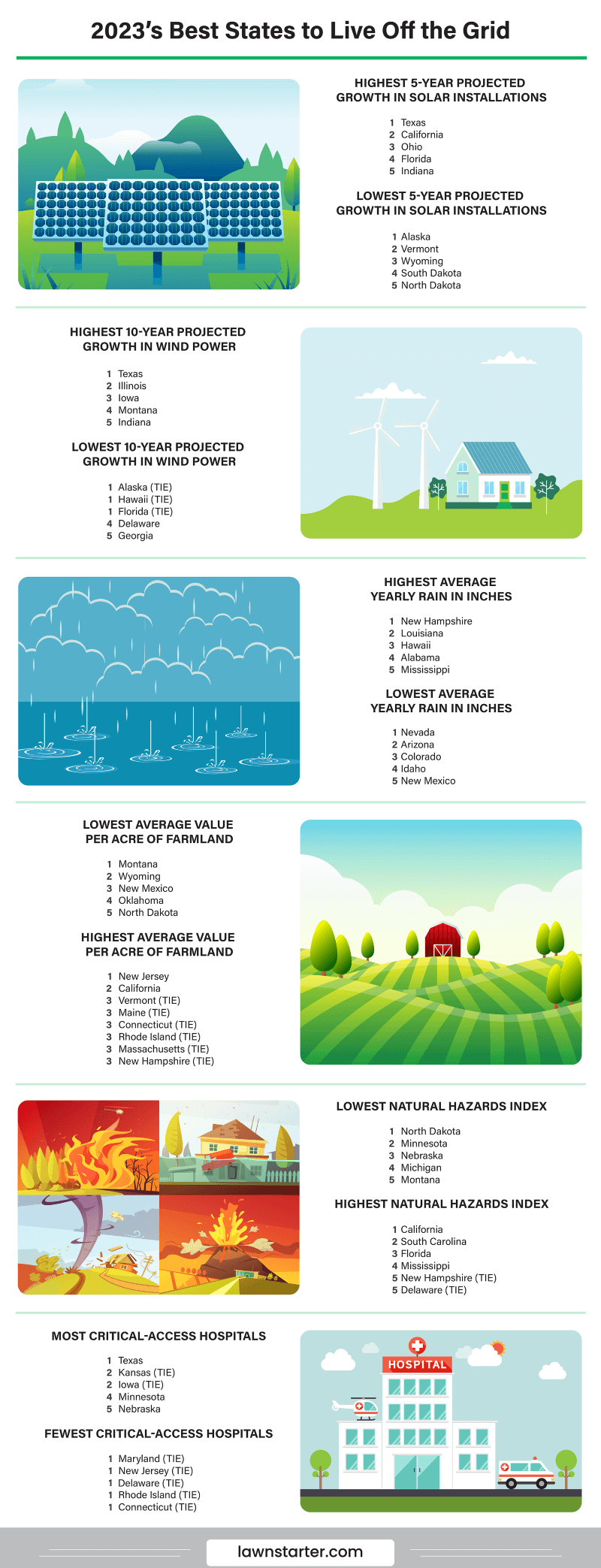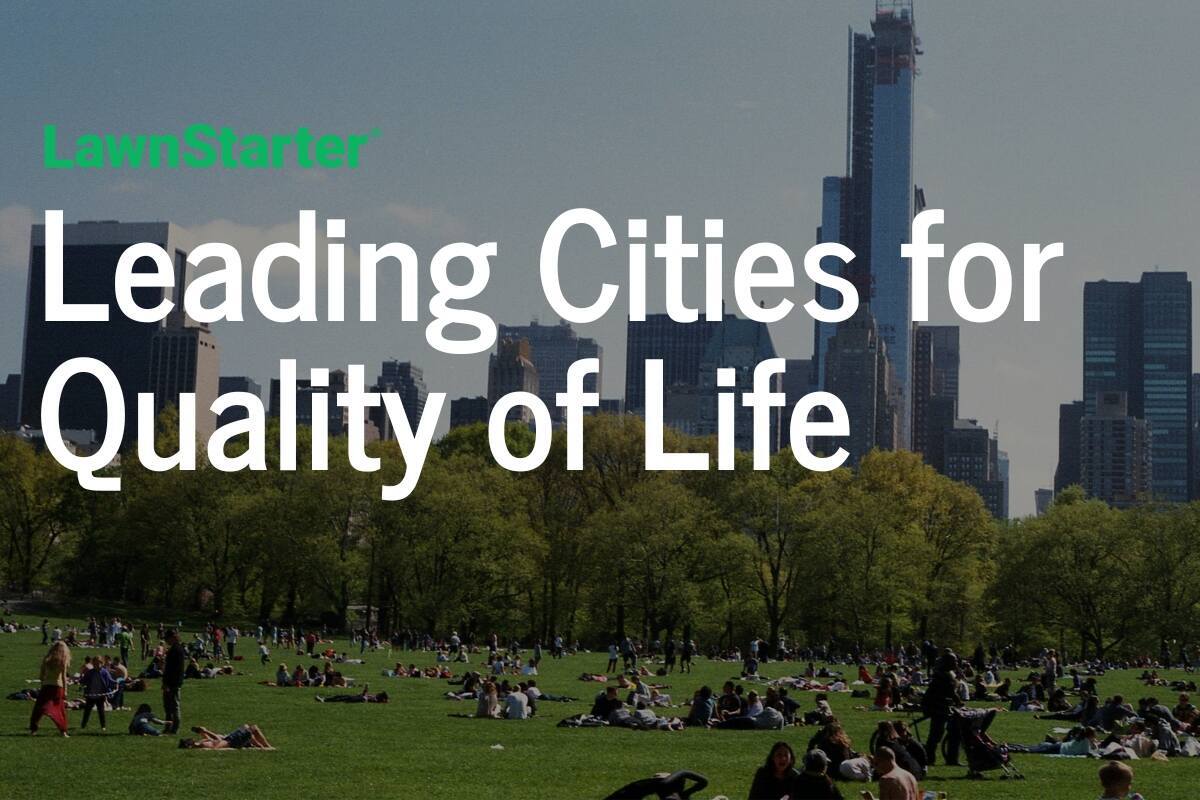
Ever want to get away from it all? Live off the land, drink rainwater, and read by candlelight?
Some states are better for a life among the trees.
To help you find your own remote slice of heaven, LawnStarter ranked 2023’s Best States to Live Off the Grid.
We compared the 50 states based on 23 key factors, such as the cost of farmland, legality of self-generated utilities, and availability of renewable energy. We also considered indicators like climate, phone connectivity, and access to rural hospitals.
See how your state fared below, followed by our assessment of the rankings and expert tips on unplugging from society.
Contents
State Rankings
See how each state fared in our ranking:
| Overall Rank (1=Best) | State | Overall Score | Feasibility Rank | Infrastructure Rank | Affordability Rank | Climate Rank | Safety Rank |
|---|---|---|---|---|---|---|---|
| 1 | Iowa | 67.12 | 12 | 2 | 31 | 27 | 1 |
| 2 | Texas | 65.58 | 8 | 1 | 25 | 28 | 20 |
| 3 | Kentucky | 63.36 | 20 | 30 | 30 | 12 | 2 |
| 4 | Minnesota | 61.25 | 9 | 20 | 18 | 44 | 4 |
| 5 | Oklahoma | 61.09 | 11 | 9 | 7 | 19 | 17 |
| 6 | Nebraska | 61.00 | 6 | 19 | 24 | 36 | 5 |
| 7 | Kansas | 60.58 | 34 | 11 | 6 | 29 | 3 |
| 8 | North Dakota | 59.54 | 4 | 10 | 4 | 48 | 13 |
| 9 | Illinois | 58.90 | 16 | 12 | 39 | 33 | 6 |
| 10 | Montana | 58.50 | 3 | 5 | 2 | 49 | 25 |
| 11 | Missouri | 58.25 | 14 | 35 | 19 | 20 | 10 |
| 12 | Wyoming | 57.84 | 2 | 16 | 1 | 43 | 26 |
| 13 | South Dakota | 57.74 | 22 | 6 | 25 | 41 | 11 |
| 14 | Wisconsin | 57.19 | 17 | 32 | 28 | 38 | 7 |
| 15 | Vermont | 56.87 | 19 | 4 | 46 | 42 | 9 |
| 16 | Arkansas | 56.84 | 13 | 43 | 12 | 8 | 23 |
| 17 | Idaho | 56.64 | 5 | 8 | 15 | 45 | 27 |
| 18 | Tennessee | 55.54 | 29 | 21 | 13 | 16 | 18 |
| 19 | Oregon | 55.18 | 7 | 7 | 32 | 37 | 31 |
| 20 | Maine | 54.25 | 15 | 13 | 42 | 26 | 24 |
| 21 | West Virginia | 54.07 | 18 | 47 | 11 | 40 | 14 |
| 22 | Indiana | 52.91 | 39 | 14 | 20 | 22 | 15 |
| 23 | Georgia | 52.42 | 27 | 29 | 22 | 13 | 28 |
| 24 | Ohio | 52.32 | 31 | 17 | 33 | 34 | 15 |
| 25 | Louisiana | 52.24 | 25 | 42 | 21 | 4 | 30 |
| 26 | Mississippi | 52.15 | 36 | 45 | 16 | 14 | 12 |
| 27 | Washington | 51.12 | 35 | 15 | 17 | 46 | 21 |
| 28 | New Hampshire | 50.99 | 30 | 32 | 43 | 31 | 8 |
| 28 | Alabama | 50.99 | 37 | 25 | 9 | 9 | 29 |
| 30 | Virginia | 50.80 | 28 | 28 | 29 | 10 | 33 |
| 31 | South Carolina | 50.43 | 21 | 31 | 14 | 6 | 45 |
| 32 | New Mexico | 49.95 | 32 | 22 | 8 | 25 | 35 |
| 33 | Hawaii | 49.55 | 9 | 46 | 48 | 1 | 36 |
| 34 | California | 49.09 | 23 | 3 | 49 | 7 | 40 |
| 35 | Colorado | 48.05 | 43 | 24 | 3 | 30 | 32 |
| 36 | Florida | 47.94 | 26 | 23 | 37 | 2 | 46 |
| 37 | Michigan | 47.92 | 38 | 34 | 23 | 47 | 19 |
| 38 | North Carolina | 46.79 | 40 | 27 | 27 | 5 | 37 |
| 39 | Delaware | 46.00 | 24 | 41 | 34 | 3 | 44 |
| 40 | Arizona | 45.97 | 33 | 38 | 41 | 18 | 34 |
| 41 | New York | 45.50 | 44 | 18 | 38 | 35 | 22 |
| 42 | Utah | 40.63 | 42 | 39 | 5 | 39 | 47 |
| 43 | Alaska | 40.11 | 1 | 50 | 36 | 50 | 49 |
| 44 | Pennsylvania | 40.00 | 45 | 37 | 35 | 21 | 39 |
| 45 | Nevada | 39.40 | 41 | 26 | 10 | 32 | 48 |
| 46 | Massachusetts | 37.63 | 48 | 36 | 45 | 11 | 41 |
| 47 | Maryland | 36.60 | 46 | 40 | 40 | 23 | 43 |
| 48 | Connecticut | 34.53 | 49 | 48 | 44 | 17 | 42 |
| 49 | Rhode Island | 33.52 | 50 | 49 | 47 | 15 | 38 |
| 50 | New Jersey | 28.23 | 47 | 44 | 50 | 24 | 50 |

Highlights and Lowlights
Iowa: Short for “(IoWa)nna Be Alone”?
For the best chance of surviving alone in the wilderness, pick a desolate spot in Iowa. The Hawkeye State is the No. 1 state for living off the grid in our third annual ranking.
Improvements in its Infrastructure and Safety scores helped the state move four spots up this year and to eclipse Texas, our previous gold medalist. In individual factors, Iowa leaped from 29th to first place in phone coverage and replaced Kansas as the eighth cheapest state in which to live.
Those are just the upgrades. The Hawkeye State remains tied for the top spot for generating your own utilities and a leader in renewable energy production (No. 7), especially wind power (No. 3 in projected 10-year growth).
All things considered, there’s little downside to isolating in the Land Where the Tall Corn Grows.
The Great Plains Escape
Flyover country might not be as popular of a region to inhabit as the urban coasts, but that makes it the ideal place to live off the grid.
Six flyover states — the Great Plains, in particular — landed in our top 10. Texas (No. 2 overall) maintains its lead in the region this year, while Colorado ranks the lowest at No. 35. Most placed in the top 10 of our Feasibility and Infrastructure categories — in other words, they actively encourage an independent lifestyle.
Self-sufficiency is an important component of this way of life. There’s no better place to grow your own crops than in the Great Plains. In fact, six of our top 10 states from the Heartland are also among the top 10 agriculture-producing states.
Alaska: Best for the Anti-Social
If you don’t enjoy small talk — or if you’re trying to escape a seedy past — The Last Frontier will happily indulge your isolationist tendencies.
Alaska actually isn’t the most off-grid lifestyle-friendly state at No. 43 overall (down one spot from last year). It has a brutal climate and lacks the critical infrastructure.
However, the Land of the Midnight Sun is the least densely populated state (0.4 residents per square mile) and the least connected by phone (23.2%). You’re likely to run into more bears than humans.
Gridlocked Northeast
Unless you can produce your own electricity, collect your own drinking water, and manage your own waste, it’s hard to unplug from the grid.
Nine of our worst 10 states also have the strictest off-grid laws, and seven of them are in the Northeastern U.S. The three other states — Utah, Alaska, and Nevada — are all in the West. New Jersey finished last overall.
Granted, this region is also the most densely populated, so close encounters with the human kind are inevitable.
Ask The Experts
Living apart from the rest of society can be challenging. To help you navigate the territory, we turned to a panel of experts for tips on successfully transitioning to an off-grid lifestyle.
Read their thoughts on the following questions below.
- What are the most important considerations for anyone contemplating living off-grid?
- Besides adequate natural resources, what else is crucial to a successful off-grid lifestyle?
- What types of people are best suited to off-grid living?
- What unexpected challenges should people consider living off the grid be aware of?
- Is living off the grid sustainable long-term? Why or why not?



What are the most important considerations for anyone contemplating living off-grid?
To live off-grid, you must be ready to live oft times without modern conveniences.
Besides adequate natural resources, what else is crucial to a successful off-grid lifestyle?
Availability of solar techs and people with off-grid expertise in the neighborhood
Philip: You also need a power backup plan that often involves another physical system, like storage batteries or a fossil-fuel-powered electrical generator. And for all of it, you need to have the budget to afford these systems.
What types of people are best suited to off-grid living?
I would say adaptability and attitude are the most important traits you need to thrive in this environment.
What unexpected challenges should people considering living off the grid be aware of?
Just when you think you have everything covered, you find another glitch in your system. We have solar coverage but during winter have such a limited window with the southern sun. We then depend on hydro and our generator backup.
Is living off the grid sustainable long-term? Why or why not?
Absolutely. We are thrilled not to depend on the electric grid for our power needs.

What are the most important considerations for anyone contemplating living off-grid?
Culture Shock. I say this because it is a big umbrella term that captures a lot of issues to this major change in lifestyle.
While human life has some immutable qualities like eating, chores, bathroom, etc., every single one of these things is different off the grid.
Washing clothes takes longer, making food takes longer, everything takes longer, and you have to be ready to live with those shocks safely both physically and mentally.
Eventually it becomes routine as all things, do but this first period can be a huge shock and a lot of work.
In short be ready to devote 100% of your days to your lifestyle. Video games become farming, work commutes become hand-washing laundry, going out to see people becomes chopping firewood.
Consider just how much you are willing to change before you make the jump.
Besides adequate natural resources, what else is crucial to a successful off-grid lifestyle?
Support and preparation for change. For example, if you have all the natural resources in the world but you break a toe, will you have someone to be sure the crops get watered while you recover?
If not, you lose all of your food for the coming months over a simple injury.
If your tiny house, teepee, or whatever dwelling is burned in a fire, do you have someone you know who could rebuild it? Can you rebuild it yourself? Who will water the crops while you rebuild the house?
So many people think that if they can just save up to buy a few things, they can go off grid, never thinking about what to do if the wonder gadgets break.
It is vital to point out that it is very rare to find even ancient peoples living fully disconnected from a large society. Even the mountain men of early America traded with society for supplies and medicine. They traded furs to fund these needs, so even off the grid, you will likely need some form of livelihood and friends to cover disaster or unexpected expenses.
What types of people are best suited to off-grid living?
This is a dangerous question as it makes pride enter into the situation. Everyone takes risks living this way, even the best trained Navy SEALs.
Regardless, I will say that to best UNDERSTAND what you are about to undertake, it is best if you start small. Spend a week primitive camping, then two weeks if it works.
Live in an off-the-grid monastery or commune for a month. Give yourself a safe time frame to sample the lifestyle in either individual or group ways before totally diving in.
Be realistic with your limitations and discomforts as you go to see if these are lifestyle risks you are willing to live with.
What unexpected challenges should people considering living off the grid be aware of?
I mention a lot of these above: injury, genetic disorders flaring up in later life, natural disaster, hunger, things breaking that you didn’t build yourself, animal issues, and on and on.
In short, most people I encounter like to “prep” to live off the grid, but don’t follow through. You have to be OK with the dark side of off-the-grid living just as much as the dream of independence and nature.
Is living off the grid sustainable long-term? Why or why not?
Depends on how you define sustainable. Sustainable for an individual long term, yes. Sustainable for society long term, not now.
A few people living off grid is a great way to diversify lifestyles and reduce demand on already taxed systems, making these systems more sustainable for those that keep using them.
However, if everyone went off the grid at once we would forage the land barren and likely ruin water systems. There are just too many of us now due to modern agriculture and clean water.
Ironically, to make off-the-grid living sustainable long term we would have to build a new kind of green grid to support and interconnect homesteads’ resources.
Methodology
For each of the 50 states, we gathered publicly available data on the factors listed in the table below.
We then grouped those factors into five categories: Feasibility, Infrastructure, Affordability, Climate, and Safety.
Next, we calculated weighted scores for each state in each category.
Finally, we averaged the scores for each state across all categories.
The state that earned the highest average score was ranked “Best” (No. 1), while the state with the lowest was ranked “Worst” (No. 200). (Note: The “Worst” among individual factors may not be No. 50 due to ties.)
| Metric | Weighting | Min. Value | Max. Value | Best |
|---|---|---|---|---|
Feasibility|
| | |||
| Suitability of Electric, Water, and Waste Laws for Off-Grid Living | 3 | 0 | 3 | Max. Value |
| Population Density in Rural Areas (Residents per Square Mile) | 2 | 0.4 | 154 | Max. Value |
Infrastructure|
| | |||
| Phone Coverage | 1 | 23.2% | 100% | Max. Value |
| Share of Major Roads in Poor or Mediocre Condition | 1 | 14% | 75% | Min. Value |
| Share of Electricity Produced from Renewable Sources | 2 | 2.7% | 99.7% | Max. Value |
| Projected 5-Year Growth of Solar Installations (in Megawatts) | 2 | 66 | 40,136 | Max. Value |
| Projected 10-Year Growth of Wind Power Production (in Megawatts) | 2 | 0 | 43,640 | Max. Value |
Affordability|
| | |||
| Average Per-Acre Value of Cropland | 2 | $1,050 | $14,800 | Min. Value |
| Property Tax Rate | 1 | 0.31% | 2.13% | Min. Value |
| Cost of Living Index | 2 | 83 | 193 | Min. Value |
| Rural Poverty Rate | 1 | 7% | 22% | Min. Value |
Climate|
| | |||
| Average Yearly Amount of Sunshine | 3 | 39.3% | 82% | Max. Value |
| Average Yearly Rain (in Inches) | 2 | 8.1 | 68.7 | Max. Value |
| Yearly Average Number of Very Cold Days | 1 | 0 | 204.5 | Min. Value |
| Yearly Average Number of Very Hot Days | 1 | 3.5 | 103.2 | Min. Value |
Safety|
| | |||
| Number of Air Quality Violations (Latest Year) | 1 | 1 | 473 | Min. Value |
| Number of Water Quality Violations (Latest Year) | 1 | 1 | 3,467 | Min. Value |
| Toxic Chemicals Release per Square Mile | 1 | 37.2 | 4,203.6 | Min. Value |
| Natural Hazards Index | 2 | 9.2 | 15.8 | Min. Value |
| Rural Hospitals per 1,000 Square Miles | 2 | 0.03 | 2.03 | Max. Value |
| Rural Health Clinics per 1,000 Square Miles | 2 | 0 | 8.07 | Max. Value |
| Number of Critical-Access Hospitals | 2 | 0 | 88 | Max. Value |
| Crime Rate (per 1,000 Residents) | 2 | 0 | 216.6 | Min. Value |
Sources: Best Neighborhood, Federal Bureau of Investigation, Flex Monitoring Team, National Center for Disaster Preparedness, National Oceanic and Atmospheric Administration, National Transportation Research Nonprofit, Nebraska Department of Environment & Energy, Primal Survivor, Rural Health Information Hub, Sheps Center, Solar Energy Industries Association, Tax Foundation, U.S. Census Bureau, U.S. Department of Agriculture, U.S. Department of Energy, U.S. Energy Information Administration, U.S. Environmental Protection Agency, and World Population Review
Far from the Madding Crowd
Whether you feel overconnected or are passionate about saving the planet, moving off the grid is a good step in the right direction.
Our ranking shows which states are suitable for unplugging from the electric grid — and from society — and which will leave you feeling claustrophobic.
While living off-grid might make you feel isolated, you certainly wouldn’t be alone. Over 250,000 people already live off the grid in the U.S, and more will join. By some estimates, as many as 12% of all Americans will be off-grid by 2035.
In places like New York’s Oak Island, the DIY lifestyle has been the dominant way of life for generations. In Texas, the colossal power grid failure in 2021 was a wake-up call for residents.
Climate change is threatening power grids in other states. So, if you’re considering a remote, self-reliant lifestyle, there’s never been a better time than now.
Main Photo Credit: Shutterstock




